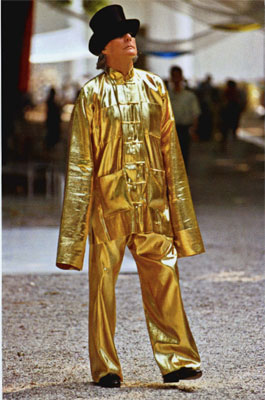
New tools equal new perceptions.
Through science we create technology and in using our new tools we recreate ourselves. But until very recently in our history, no democratic populace, no legislative body, ever indicated by choice, by vote, how this process should play out.
Nobody ever voted for printing. Nobody ever voted for electricity. Nobody ever voted for radio, the telephone, the automobile, the airplane, television. Nobody ever voted for penicillin, antibiotics, the pill. Nobody ever voted for space travel, massively parallel computing, nuclear power, the personal computer, the Internet, email, cell phones, the Web, Google, cloning, sequencing the entire human genome. We are moving towards the redefinition of life, to the edge of creating life itself. While science may or may not be the only news, it is the news that stays news.
And our politicians, our governments? Always years behind, the best they can do is play catch up.
Nobel laureate James Watson, who discovered the DNA double helix, and genomics pioneer J. Craig Venter, recently were awarded Double Helix Awards from Cold Spring Harbor Laboratory for being the founding fathers of human genome sequencing. They are the first two human beings to have their complete genetic information decoded.
Watson noted during his acceptance speech that he doesn't want government involved in decisions concerning how people choose to handle information about their personal genomes.
Venter is on the brink of creating the first artificial life form on Earth. He has already announced transplanting the information from one genome into another. In other words, your dog becomes your cat. He has privately alluded to important scientific progress in his lab, the result of which, if and when realized, will change everything.
WHAT WILL CHANGE EVERYTHING?
"What game-changing scientific ideas and developments do you expect to live to see?"
—John Brockman
Editor and Publisher
 |
 |
|
|
| - PRESS COVERAGE - |
|
|
 |
|
|
|
(Science Blog) |
||
|
|
||
|
|
 |
|
 |
|
 "Question was open because it had not yet received any form; it was a kind of prime matter, or a substance that existed in a realm of potentiality, an indefinite state that had not yet become anything in particular and maybe never would. But any formed object, on the other hand, would have denied all that: if it has already received form it is over, closed, ended; it has slid from the vague cloud of potentiality into a collision with the flat wall of fact that lay hidden behind it. " —Thomas McEvilley (Art in America, November, 2008)
James Lee Byars By Thomas McEvilley Further Reading on Edge on James Lee Byars and The World Question Center: "He Confuses One And Two The 200 I.Q.: Mr. Byars By Mr. Brockman" [7.17.97] |

















